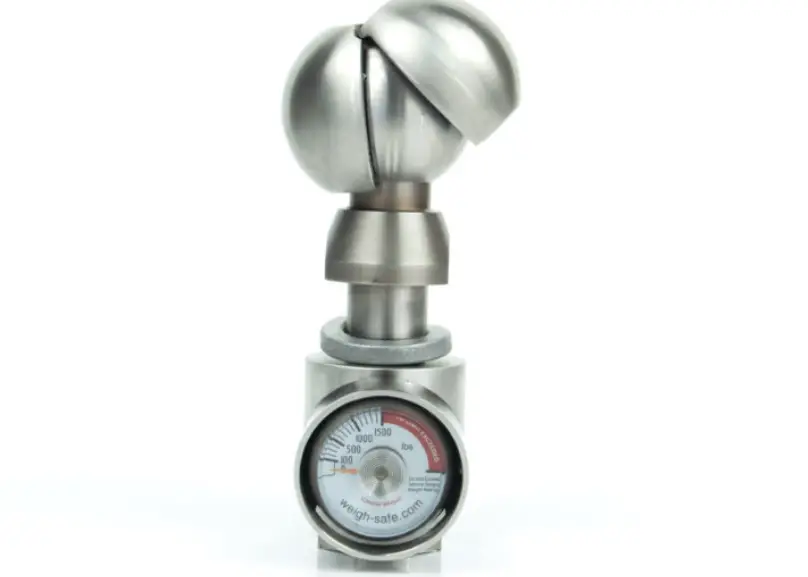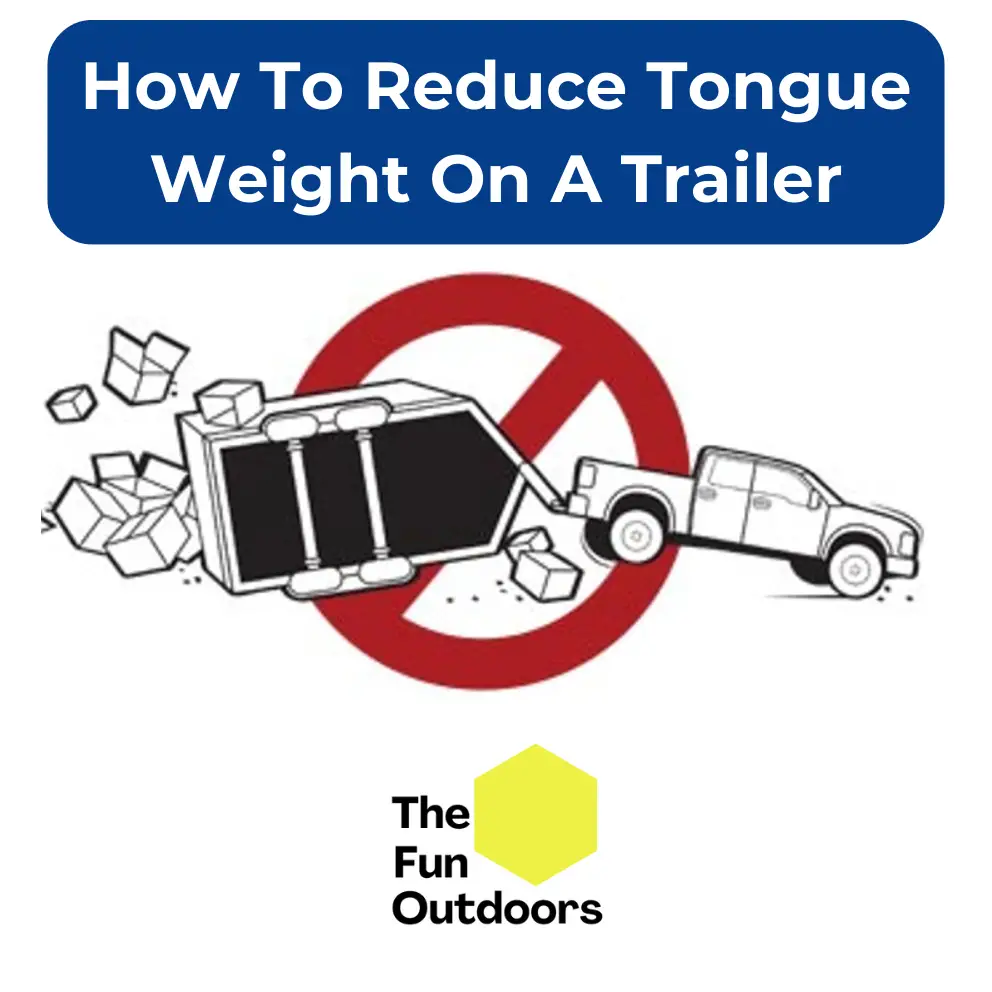When the tongue weight is too heavy or too light, it can cause issues with steering, braking, and trailer sway. Knowing how to rreduce tongue weight on a trailer is essential for a safe and comfortable towing experience. To reduce trailer tongue weight, you can redistribute the load, break the load up into multiple trips, adjust the hitch ball height, or get a hitch with a higher class rating.
We’ll go over everything you need to know in this guide.
Key Takeaways
- Tongue weight is the amount of weight pressing down on the hitch ball of your trailer and should be no more than 15% of the Gross Trailer Weight (GTW).
- Too heavy tongue weight can cause the front of your vehicle to lift, reducing the amount of weight on your front wheels, which can make steering difficult.
- Too light tongue weight can cause the trailer to sway, making it hard to control.
- You can reduce trailer tongue weight by getting a beefier hitch, adjusting the height of the trailer ball, reducing the weight on the trailer, or redistributing the trailer cargo load.
What Is Tongue Weight On A Trailer?
When it comes to towing a trailer, understanding tongue weight is crucial. Tongue weight refers to the amount of weight that the trailer’s tongue puts on the hitch ball of the towing vehicle.
This weight is important because it affects the stability and safety of the trailer while it is being towed.
Importance of Tongue Weight
Proper tongue weight distribution is essential for safe towing. If the tongue weight is too light, the trailer may sway or fishtail, making it difficult to control.
If the tongue weight is too heavy, it can cause the tow vehicle to sag, affecting its handling and braking abilities.
It is crucial to your safety to maintain the recommended tongue weight for your trailer.
Tongue Weight vs Gross Trailer Weight
Tongue weight is often confused with gross trailer weight (GTW). GTW refers to the total weight of the trailer, including the weight of the cargo and any accessories.
Tongue weight is a percentage of the GTW and is typically between 9% to 14%. It is important to note that the tongue weight should never exceed the GTW.
Tongue Weight Scale and Measurements
To measure the tongue weight, you can use a tongue weight scale. This device is specially designed to measure the weight that the tongue puts on the hitch ball.
You can also measure the tongue weight by using a bathroom scale and a few simple calculations.
See Related: How To Read a CAT Scale Ticket
How to Reduce Tongue Weight on a Trailer
If you are towing a trailer, it is essential to ensure that the tongue weight is within safe limits. The tongue weight is the downward force exerted by the trailer’s tongue on the hitch ball of the towing vehicle.
The ideal tongue weight is between 10-15% of the fully loaded trailer weight. Too much or too little tongue weight can cause instability and unsafe towing conditions.
Here are some ways to reduce tongue weight on a trailer:
Weight Redistribution
One of the easiest ways to reduce tongue weight is by redistributing the load. Shifting heavier items towards the back of the trailer can help reduce the tongue weight.
Ensure that the load is evenly distributed from side to side and that the heaviest items are placed over the axles.
Following the 60/40 rule when loading a trailer can also help reduce tongue weight. This rule states that 60% of the load should be over or in front of the trailer’s axle.
Cargo Adjustments
If redistributing the load does not reduce the tongue weight enough, you may need to make some tough decisions about what to bring along.
Downsizing and leaving behind non-essential items can help reduce overall trailer weight and, in turn, reduce tongue weight.
Weight Separations
If cargo adjustments and weight redistribution do not work, you may need to consider weight separations.
This involves separating the load into multiple trips or finding alternative means of transportation for some items.
Ensure the Height of the Trailer Hitch/Ball is Right
Ensuring that the hitch ball is level with the trailer can also help reduce tongue weight. Adjusting the hitch ball height can help lower the tongue weight load.
A hitch that is too high will put more pressure on the trailer’s axles, while a hitch that is too low will put more pressure on the tow vehicle.
The best solution is to ensure that the tow hitch and trailer are as near to level as possible.
See Related: How To Level A Camper
Have Your Truck Fitted with a Higher Class Hitch
If you need to haul heavier loads, you may need to invest in a higher class hitch. A weight distribution hitch can also help distribute the trailer’s weight towards the front axle of the towing vehicle.
Be sure to check with your truck manufacturer to ensure that the hitch can handle the additional tongue weight.
Buy A Bigger Towing Vehicle with a Bigger Hitch
If you frequently tow heavy loads, you may want to consider upgrading your towing vehicle. A bigger towing vehicle with a bigger hitch can handle heavier loads and reduce tongue weight.
See Related: Does The Length A Travel Trailer Include The Hitch?
Trailer Hitch and Weight Distribution

When it comes to towing a trailer, understanding the different components of your hitch is crucial to ensure a safe and smooth ride.
In this section, we’ll cover the basics of trailer hitches and weight distribution, including the hitch ball and ball mount.
Understanding Trailer Hitch
The trailer hitch is the part of your vehicle that connects to the trailer and supports its weight. It’s essential to choose a hitch that is compatible with your vehicle’s towing capacity and the weight of your trailer.
Trailer hitches come in different classes, ranging from class I to class V, with class V being the most heavy-duty. It’s essential to choose the right class for your vehicle and trailer to ensure safe and efficient towing.
Weight Distribution Hitch
A weight distribution hitch is a device that helps distribute the weight of your trailer evenly across all four wheels of your vehicle.
This helps improve stability and control while towing, especially when carrying heavy loads.
Weight distribution hitches work by transferring some of the weight from the trailer’s tongue to the front axle of your vehicle.
This helps prevent the rear of your vehicle from sagging, which can affect steering and braking.
Hitch Ball and Ball Mount
The hitch ball and ball mount are the components that connect the trailer to the hitch. The hitch ball is attached to the ball mount, which is then inserted into the hitch receiver on your vehicle.
It’s essential to choose the right size hitch ball and ball mount for your trailer and hitch receiver. The most common hitch ball sizes are 1-7/8″, 2″, and 2-5/16″.
Make sure to choose a ball mount with the correct drop or rise to ensure that your trailer is level when attached to your vehicle.
See Related: Where Is My Trailer’s VIN Number?
Frequently Asked Questions
What is the ideal percentage of tongue weight for a trailer?
The ideal tongue weight for a trailer should be between 9% to 15% of the Gross Trailer Weight (GTW). If the tongue weight is too light, the trailer can sway and be difficult to control.
If it’s too heavy, it can cause damage to your vehicle and affect braking and steering.
Can using a weight distribution hitch reduce tongue weight?
Yes, a weight distribution hitch can help reduce tongue weight by distributing the weight evenly across the trailer and the tow vehicle. This can improve stability and control while towing.
What can happen if the tongue weight of a trailer is too high?
If the tongue weight of a trailer is too high, it can cause the tow vehicle’s rear suspension to sag, which can affect the steering and braking.
It can also cause the front wheels of the tow vehicle to lift, reducing traction and control. In extreme cases, it can cause the trailer to jackknife.
How do I determine the tongue weight of my trailer using a scale?
To determine the tongue weight of your trailer, you will need to use a scale. First, ensure that the trailer is level and the weight is distributed evenly.
Then, position the scale under the trailer tongue and lift it until the weight is off the hitch. The weight displayed on the scale is the tongue weight of your trailer.
See Related: How Much Does A Pop Up Camper Weigh?

